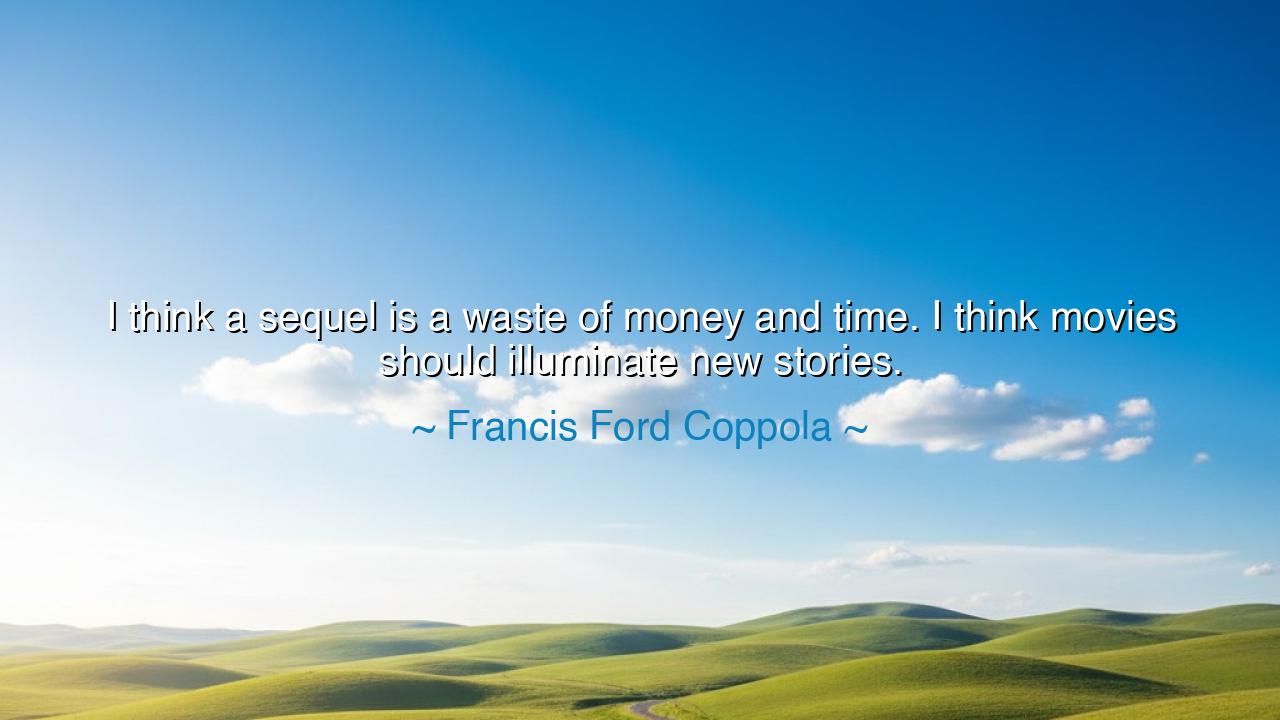
I think a sequel is a waste of money and time. I think movies
I think a sequel is a waste of money and time. I think movies should illuminate new stories.






"I think a sequel is a waste of money and time. I think movies should illuminate new stories." These words from Francis Ford Coppola, the legendary director of The Godfather and Apocalypse Now, reflect a profound philosophy about the creative process and the purpose of storytelling. Coppola’s assertion that sequels are a waste of money and time challenges the very foundation of modern filmmaking, which often relies on repeating or expanding upon existing narratives for the sake of financial gain. Instead, Coppola believes that cinema, at its core, is meant to illuminate new stories, to offer fresh perspectives, and to explore uncharted territories. This philosophy calls for the pursuit of originality, a pursuit that challenges the artist to dig deeper into the unknown, to bring forth stories that have not yet been told.
To understand the depth of Coppola's sentiment, one must look beyond the monetary and commercial success of sequels in today’s entertainment industry. A sequel, by definition, is an attempt to continue a previously successful story. While this can offer comfort to audiences who are familiar with beloved characters and settings, it can also become a creative trap, encouraging filmmakers to rely on the success of the past rather than pushing the boundaries of what is possible. In this sense, a sequel, though financially lucrative, often fails to serve the true purpose of art—innovation, discovery, and the exploration of new ideas. Just as the ancient Greeks understood that the purpose of tragedy was not simply to entertain but to provoke thought and offer insight into the human experience, Coppola believes that films should challenge us to look forward, not backward.
Art, in all its forms, is meant to be a reflection of the world as it evolves. When artists, whether playwrights, painters, or filmmakers, repeat the same story over and over, they risk losing the very essence of their craft. Shakespeare, for example, did not write Hamlet II or revisit the same characters in multiple plays; instead, he explored new stories, new themes, and new emotions. His works continue to resonate because they were not bound by the past, but instead offered fresh insights into the complexities of human nature. Much like Shakespeare, Coppola believed that cinema should move forward, exploring new themes and pushing boundaries, rather than rehashing what has already been done.
Consider the impact of Coppola’s own work with The Godfather trilogy. The first film, a masterful adaptation of Mario Puzo’s novel, set the standard for cinematic storytelling. Yet, rather than merely resting on the laurels of success, Coppola created a second film that expanded on the themes of power, family, and morality. He pushed the story into darker and deeper realms, not as a mere continuation, but as a profound meditation on the consequences of one’s choices. The third film, while often debated, was not simply a repeat of the earlier ones but a complex exploration of the passage of time, the struggle for redemption, and the weight of legacy. In this way, Coppola’s work exemplified his belief that movies should illuminate new stories—continuations only if they have something new and meaningful to say, not for the sake of commerce or familiarity.
In this regard, Coppola's philosophy mirrors the wisdom of ancient thinkers who believed in the importance of originality in thought and action. Aristotle, in his Poetics, speaks of the need for innovation in storytelling, suggesting that the most powerful stories are those that resonate with universal truths while offering something new. Just as the philosophers of ancient Greece valued the pursuit of knowledge and the unveiling of new truths, Coppola urges filmmakers and artists to seek originality in their work—an originality that challenges both the artist and the audience to see the world in a new light.
The lesson here, then, is not just for filmmakers but for all creators, for all individuals who seek to make an impact in the world. It is a reminder that true greatness lies in the ability to think beyond what has already been established, to seek out new horizons, and to embrace the unknown. Just as Coppola believed that a film should illuminate new stories, so too should our lives be driven by the quest for personal growth and innovation. To settle for repetition—whether in our work, our relationships, or our personal aspirations—is to risk falling into the trap of mediocrity. True fulfillment comes when we allow ourselves to create, discover, and express the new, rather than clinging to what is comfortable or familiar.
In practical terms, this means that we must challenge ourselves to seek out new experiences and new perspectives. We must embrace change and creativity, not only in our work but in our personal growth. Like Coppola, we should strive to create something that has not been seen before, to offer something fresh to the world, even if it requires stepping out of our comfort zones. The true value of our lives is found in our ability to constantly reinvent, question, and push forward into the unknown. Like the great artists of the past, we too must take the brave step to create not just for the sake of repetition or tradition but to bring something new into the world—something that speaks to the present and future, not the past.






AAdministratorAdministrator
Welcome, honored guests. Please leave a comment, we will respond soon